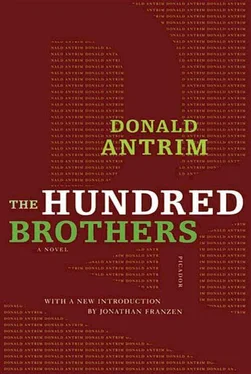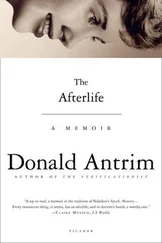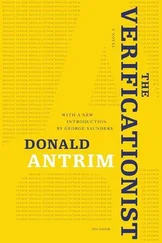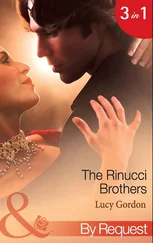Donald Antrim
The Hundred Brothers
For my father
HARRY THOMAS ANTRIM
and for his brother
ROBERT ELDRIDGE ANTRIM (1940–1992)
INTRODUCTION BY JONATHAN FRANZEN
The Hundred Brothers is possibly the strangest novel ever published by an American. Its author, Donald Antrim, is arguably more unlike any other living writer than any other living writer. And yet, paradoxically — in much the same way that the novel’s narrator, Doug, is at once the most singular of his father’s hundred sons and the one who most profoundly expresses the sorrows and desires and neuroses of the other ninety-nine— The Hundred Brothers is also the most representative of novels. It speaks like none of us for all of us.
Midway through his narrative, Doug spells out the fundamental fact that drives it: “I love my brothers and I hate their guts.” The beauty of the novel is that Antrim has created a narrator who reproduces, in the reader, the same volatile mixture of feelings regarding the narrator himself: Doug is at once irresistibly lovable and unbearably frustrating. The genius of the novel is that it maps these contradictory feelings onto the archetypal figure of the scapegoat: the exemplary sufferer who recurs throughout human history, most notably in the person of Jesus of Nazareth, as an object of both love and homicidal rage, and who must be ritually killed in order for the rest of us to go on living with the contradictions in our lesser hearts.
In modern times, the role of the exemplary sufferer has come to be played by artists. Non-artists depend on and cherish artists for giving pleasing form to the central experiences of being human. At the same, artists are resented, sometimes even homicidally, for the dubiety of their moral character and for bringing to consciousness painful truths that non-artists prefer to remain unconscious of. Artists will drive you crazy, and The Hundred Brothers is a perfect instance of the work of art that seduces you with its beauty and power and then maddens you with its craziness. It’s often hilarious, but there’s always a dangerous edge to the hilarity. When, for example, Doug is describing the complicated seating chart for the dinner table at which he and ninety-eight of his brothers gather in a scene reminiscent of the Last Supper, he notes that his own name, unlike all the others, is written in “bright orange,” and that he’s “never been able to figure out the logic behind this.” The orange writing recalls the fire that several brothers are building in the book’s opening pages and the flames that illuminate the primitive ritual with which the book closes; the color targets Doug like a hunted animal. And the whole comedy of his situation — he simultaneously knows and resists knowing that he’s his brothers’ beloved and hated scapegoat — is encapsulated in his putative inability to “figure out the logic.” Is the logic that Doug is the family’s devoted genealogist, the former star quarterback of the family football team, the trustworthy listener to whom others turn with questions about God, and the brother who nurses his psychically and physically wounded brothers at the expense of his own needs? Or is it (as his narrative gradually and comically reveals) that Doug is a chronic liar and an unrepentant thief of his brothers’ drugs and money, has a penchant for drinking too much and misbehaving, nurtures a bizarre fetish for his brothers’ footwear, and once, as the quarterback in a crucial game, fumbled away the football in his own end zone? Or is it (as seems most likely) that Doug is the family artist, the outsider who is also the family’s deepest insider, the brother who has taken it upon himself to annually assume the role of Corn King and perform “the nocturnal dance of death and the life that grows out of death”?
The Hundred Brothers speaks for all of us because we all inescapably feel ourselves to be the special center of our private worlds. It’s a funny novel and a sad novel because this natural solipsism of ours is belied — rendered both ridiculous and tragic — by our ties of love and kinship to private worlds that we are necessarily not the center of.
At the level of technique, the book is a marvel: has to be a marvel, for, without supreme authorial control of scene and sentence and detail, it would collapse under the weight of its preposterous premise. In the opening sentence, Antrim manages to name and specify, through the magic of his commas and semicolons and dashes and parentheses, all ninety-nine of the brothers who have come together for drinks and dinner, bad masculine behavior, and avoidance of the work of giving their father’s funeral ashes a proper burial. (This opening sentence also contains the book’s first and last reference to a particular woman, Jane, who is responsible for the disappearance of the hundredth brother; it’s as if, according to the novel’s logic, the mere naming of a Significant Other is enough to exclude a brother from the narrative.) The story takes place entirely in the enormous library of the family’s ancestral mansion, from the windows of which the campfires of homeless people can be seen in the “forlorn valley” outside the property’s walls, and the action is confined to a single night, punctuated here and there by glimpses of the family’s history of brother-on-brother cruelty and violence. (Doug’s recollection of the childhood game of Kill the Man With the Ball, a game that embodies the love/hatred between siblings and prefigures their latter-day scapegoating ritual, is particularly inspired.) The incidents that occur on this single night are often farcical, often frustrating to Doug and to the reader, and always intensely vivid and specific. Taken together, they amount to a dextrous feat of choreography, in which Doug, the self-appointed Corn King, is the lead dancer who engages all the others as he makes his way around the library.
The novel is a feat of exclusion and inclusion, too. Left out of it are women (including, especially, the brother’s mother or mothers), children, any reference to a particular place or year, and any realistic accounting of how there came to be so many brothers, how they all fit into a single house, and what their lives outside the house are like. Within these fantastical confines, however, can be found a remarkably complete catalog of the things that men do and feel among men. Football, fisticuffs, food fights, chess playing, bullying, gambling, hunting, drinking, pornography, pranking, philanthropy, power tools (“Doug, I need my belt-sander back,” the brother Angus says in passing), homosexual cruising, anxieties about incontinence and penis size and middle-age weight gain: it’s all there. The book also, despite its brevity, contains a deftly telescoped genealogy of human knowledge and experience, reaching from prehistory up through a very belated present day in which civilization seems to be teetering at the brink of collapse. Just as a vast collection of books and periodicals on every subject and from every era is housed in a single leaky and neglected library, so the totality of human archetypes (“the primeval aspects of the Self,” in Doug’s phrase) are gathered together in the single heroic, failing consciousness of the narrator.
When the brothers are all seated at the dinner table, one of them makes a call for better maintenance of the library: “As some of you may know, a slow drip, directly over Philosophy of Mind, has recently waterlogged and destroyed seventy to eighty percent of Cognitive Theory.” As in some kind of nightmare of paralysis, however, the brothers are able only to notice the library’s decay, not seriously combat it. Chandelier lights flicker, rainwater pours in, bats fly around, furniture is broken, food scraps are ground into once-valuable carpets.
Читать дальше












